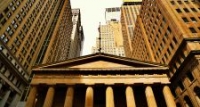Sponsored post
The London Stock Exchange is considered one of the largest in the world. A huge number of transactions are concluded on it daily, amounting to more than 37% of the daily volume of all transactions. For comparison, New York accounts for 18%, and Tokyo - only 6%. Trading in the United Kingdom is at a fairly high level, relying on a long and rich history. Many British people, one way or another, are associated with currency speculation, are well versed in their theoretical basis, the methods of their implementation and are sure that they represent a good source of income.
In England, oversight of trading participants is provided by the FCA, the Financial Conduct Authority, which replaced the FSA in 2013. It is an independent organization, and its work is sponsored by taxes, fees, and commissions. Its activities are closely monitored by the Ministry of Finance of the country and the Parliament.
The main task of the regulator is to maintain the stability of the British markets by preventing fraud from brokers and investment companies. That's why the UK has many reputable brokers who are trustworthy in the field of Forex services. London is considered the most important global financial centre for the best UK Forex brokers supervised by the FCA.
In addition, the regulation of the Forex market in the UK includes:
- Disagreement investigations;
- Determination of requirements and standards in relation to currency trading and other financial investments;
- Maintaining high-level speculative services and their further popularization;
- The introduction of a ban on further activities in detecting cases of abuse and non-compliance with accepted standards.
However, there is one key point in the work of FCA. The organization does not interfere with the essence of the market, trying to take it under control; it only monitors the relationship between customers and intermediaries. And in case of violations by brokers, punishes them.
Therefore, even in the United Kingdom, the actions of large players are not monitored in any way. Currency trading in the country, as well as around the world, is closed and opaque. And the state does not protect small traders from market makers when they manipulate quotes and other dishonest operations.
Forex Brokers and Regulation
According to FCA directives, all company-controlled organizations (brokers, dealers, investment, and insurance funds) must keep customer funds separate from their finances. All their operations are required to be carried out only through the institutions of the country. Thus, all cash flows are conducted openly, which allows them to be tracked and, in the event of bankruptcy, instantly frozen.
All firms providing intermediary services for market access are periodically audited by independent experts.
According to the rules of the FCA, the procedure has a specific time frame, and in case of unsatisfactory results or inaccurate information, the broker faces severe penalties up to the license.
The regulator does not interfere with the rest of the work of companies, for example, does not limit the amount of leverage that can reach 1 in 2000. The department does not control the activities of liquidity providers, and they often manipulate quotes in accordance with local laws.
However, among traders, confidence in the FCA is at a high level. British dealers are considered reliable and, investing through them; you can be sure of their safety.
In addition, do not forget that the regulation on the Forex market in the United Kingdom is carried out by another organization - the Bank of England.
The main task of regulating the Forex market is to create conditions for healthy competition and the safety of all its participants. Despite the fact that Forex operates on the principle of free trade, traders still need protection from unscrupulous brokers, illegal transactions. They want to have certain guarantees for the safety of invested funds.
Market regulation is carried out by the so-called regulators (public and private), which control and regulate the activities of financial organizations engaged in foreign exchange transactions.
UK financial market regulators
Until recently, regulation of the Forex market here was carried out by the state by the Bank of England and the independent Financial Services Authority (FSA), which, incidentally, is not a state organization.
Since 2013, the independent financial organization Financial Conduct Authority (FCA) has joined the previously existing regulators, the main functions of which are as follows:
- Monitoring the activities of financial companies for compliance with UK standards;
- Consideration of disputes between participants in the foreign exchange market;
- Ensuring transparency of the Forex market;
- Development of new financial instruments.
- Regulators of the Forex market in the UK deservedly enjoy the trust of traders due to their complete independence and lack of pressure from the state.






